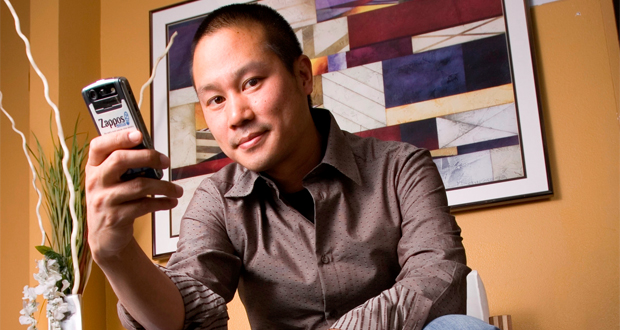At 24 years old Tony Hsieh sold LinkExchange (one of the first internet advertising cooperatives to hit the web) to Microsoft for a cool $265 million. He started out worm farming as a kid, moved up into the button business, and now runs a billion dollar company. Not too bad for a guy who slept through Harvard.
Tony is the CEO of Zappos.com—the online retailer that Amazon.com acquired for just over a billion dollars. He published his pearls of wisdom in the #1 New York Times bestseller Delivering Happiness: A Path to Profits, Passion, and Purpose, a peek into Zappos’ company culture written sans ghost writer.
A little bleary at 6am, Tony apologized for the lack of coffee in his system and proceeded to tell me how he became one of the most influential and successful entrepreneurs…before the age of 35.
Alister & Paine: What makes Zappos unique?
Tony Hsieh: If Zappos were to disappear, everyone would continue the friendships that they formed here. It’s pretty special. People look forward to going into the office because they’re going to see their friends and family.
Alister & Paine: Would you ever leave for a new e-commerce adventure?
Tony Hsieh: Zappos has nothing to do with e-commerce—it is its own separate sort of start up. It makes sense to run any venture like the Zappos brand is run, with a focus on the very best service and customer experience.
Alister & Paine: It sounded like you did a lot of sleeping in and skipping classes at Harvard—what do you attribute to your college experience?
Tony Hsieh: In college people follow their passion and start their own clubs and organizations. That’s the same mentality and organic growth that happens at Zappos. We encourage employees who are passionate about something to go out and do it and find other people in the company who are passionate about it. That helps build our culture. That creativity and self expression comes from having experienced that in college.
Alister & Paine: Tell me about your studies with the science of happiness.
Tony Hsieh: One of the most interesting concepts is perceived control, perceived connectedness and being part of something bigger than yourself. The cliché is that life’s a journey, not a destination.
I keep that in mind when thinking about how to make customers and employees happy. It’s easy to forget. It’s always good to have a reminder that really what drives us is going towards the destination, and that’s what ultimately the research has shown makes us happier.
Alister & Paine: You walked away from the full $265 million Microsoft offered you to stay at LinkExchange. Why?
Tony Hsieh: I realized I was unhappy and more money wasn’t going to make me happier. Looking at a lot of people that were there, they weren’t people that I would choose to be around. That didn’t feel right or authentic.
Alister & Paine: How did the company culture grow to what it is today?
I didn’t have this grand plan of what our culture would be. It’s evolved from listening to employees and in turn employees listening to customers.
Tony Hsieh: Our culture continues to evolve over time. We have 10 core values, which is a formalized definition of our culture. It wasn’t a few people that spent a weekend at an offsite somewhere. It came from the employees.
The hardest part and the best part are the people. When you hire the wrong people it can have a pretty devastating effect on the company. If I had to add up the cost of all the bad hires we’ve made I would estimate rollover of 100 million dollars.
Alister & Paine: What constitutes a bad hire?
Tony Hsieh: Someone that’s bad for the culture. They can end up really bringing down morale, and it has this ripple effect that can spread like a cancer. It’s something we need to act on early and as quickly as possible. There’s the temptation to hire any warm body that can meet the technical requirements. Most companies, including us, tend to hire too quickly and then fire too slowly, when it really should be the other way around.
Alister & Paine: What’s your best piece of advice to our readers?
Tony Hsieh: Figure out what you would be so passionate about that if you did it for ten years and didn’t make a dime, you’d be happy. That’s what you should focus on. The irony is that if it’s something you’re truly passionate about the money will follow.




